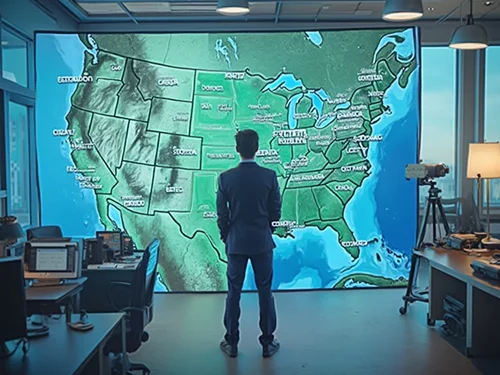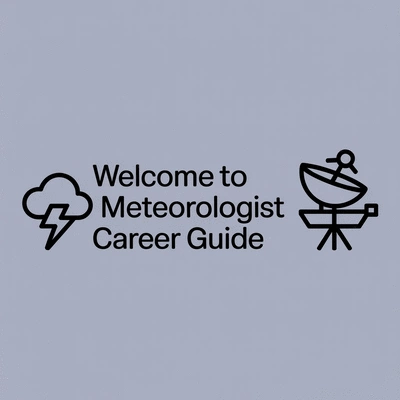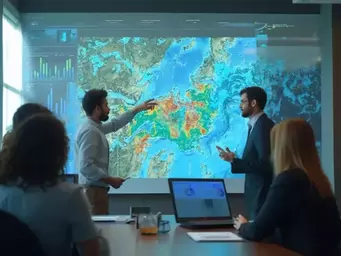As you embark on your journey to become a meteorologist, understanding the various educational pathways available can set the foundation for a successful career. Here are some essential insights to guide you.
What You Will Learn
- The importance of a university degree in meteorology, focusing on atmospheric sciences and data analysis.
- Top institutions in Australia for meteorology, including the University of Melbourne and University of Queensland, and their unique program offerings.
- Opportunities for graduate studies at the Bureau of Meteorology, emphasizing research and specialized training.
- The benefits of online courses and certifications to enhance your meteorological knowledge and skills.
- Key resources for advancing your meteorology career, including research databases, online learning platforms, and networking events.
- Steps to create a personal development plan and engage with the meteorology community for ongoing learning and career growth.
Educational Pathways & Resources for Aspiring Meteorologists
Meteorology offers diverse learning opportunities, from formal university degrees to flexible online courses and essential networking. Below is a visual guide to key institutions, learning platforms, and career development resources available in Australia.
Formal Education: University Programs
- ‣ University of Melbourne (Master of Science)
- ‣ University of Queensland (Bachelor of Science)
Focuses on atmospheric sciences, climate dynamics, data analysis, and practical skills.
Graduate Studies: Bureau of Meteorology
- ‣ Specialized Training & Research
- ‣ Access to cutting-edge data & experts
Ideal for deepening understanding and contributing to significant research projects.
Online Courses & Certifications
- ‣ Introduction to Meteorology
- ‣ Platforms: Coursera, edX, LinkedIn Learning
Flexible options for specific skill sets like data analysis, programming, and climate change.
Networking & Professional Groups
- ‣ Australian Weather Services Events
- ‣ Local Meetups & Conferences
Connecting with peers and mentors opens doors to job opportunities and collaborations.
Key Education Pathways for Aspiring Meteorologists in Australia
Embarking on a career in meteorology is an exciting journey that starts with the right education. In Australia, there are various education pathways tailored to help you gain the knowledge and skills necessary for this dynamic field. Whether you’re interested in formal degrees or online courses, there are plenty of options to choose from. Let's explore these pathways together!
Formal Education Options: Degree Programs and Institutions
A university degree is often the first step for aspiring meteorologists. Most programs focus on atmospheric sciences, providing you with a solid foundation in weather patterns, climate dynamics, and data analysis. It's important to select a program that aligns with your interests and career goals. To gain a deeper understanding of the career prospects and necessary education, you can refer to resources like the U.S. Bureau of Labor Statistics' Occupational Outlook Handbook for Atmospheric Scientists. Here are some key components to consider:
- Basic meteorology courses covering weather systems and forecasting
- Advanced studies in climate science and environmental impacts
- Practical lab sessions and fieldwork opportunities
Many institutions across Australia offer dedicated meteorology programs, each with its unique strengths. Choosing the right one can set the stage for a successful career in this vital field.
Overview of University Programs Focused on Meteorology
In Australia, universities like the University of Melbourne and the University of Queensland are at the forefront of meteorology education. They offer comprehensive programs designed to equip students with both theoretical knowledge and practical skills. These programs typically include courses on:
- Fundamentals of meteorology and atmospheric processes
- Data analysis techniques relevant to weather forecasting
- Communication strategies for conveying weather information
With hands-on experiences and expert faculty, these universities prepare students to tackle real-world challenges in meteorology.
Graduate Studies at the Bureau of Meteorology
For those looking to further their education, the Bureau of Meteorology offers graduate studies that focus on research and specialized training. These programs are ideal for aspiring meteorologists who wish to deepen their understanding and contribute to significant research projects. Consider the benefits:
- Access to cutting-edge research and data
- Opportunities to work alongside leading experts in the field
- Insight into national and global weather patterns
Engaging in graduate studies at the Bureau not only enhances your knowledge but also positions you as a valuable asset in the job market.
Top Meteorology Programs in Australia: University of Melbourne and University of Queensland
As mentioned earlier, the University of Melbourne and the University of Queensland offer some of the best meteorology programs in Australia. Each institution has unique features that make them stand out:
- University of Melbourne: Offers a Master of Science in Meteorology with a strong emphasis on research and innovative forecasting techniques.
- University of Queensland: Known for its hands-on approach, this university provides a Bachelor of Science with a major in Meteorology, focusing on practical skills.
Both universities not only prepare you academically but also provide vital networking opportunities through their connections with industry professionals.
Online Courses and Certifications to Enhance Your Knowledge
In addition to formal education, online courses and certifications can significantly boost your meteorological knowledge. These options are flexible and often provide specific skill sets tailored to your career goals.
- Courses in data analysis and programming tailored for meteorology
- Certifications in specialized areas like climate change and environmental forecasting
- Workshops and webinars hosted by leading meteorological organizations
Completing these online courses will not only enhance your résumé but also give you a broader perspective on current meteorological challenges.
Accessing the Introduction to Meteorology Course
One excellent starting point is the Introduction to Meteorology Course available through various online platforms. This course typically covers:
- Basic concepts of meteorology and atmospheric science
- Overview of weather systems and forecasting techniques
- Real-life applications of meteorological data
Taking this course can lay a solid foundation for your understanding of weather science, making it easier to dive deeper into more advanced topics.
Other Notable Online Learning Platforms: Coursera, edX, and LinkedIn Learning
Several online learning platforms offer valuable courses in meteorology and related fields. Platforms like Coursera, edX, and LinkedIn Learning provide a variety of options that can fit your schedule and learning style.
- On Coursera, you can find courses from top universities that delve into climate science and data analysis.
- edX offers professional certifications that can bolster your credentials in the field.
- LinkedIn Learning has short courses that focus on practical skills like using meteorological software.
By exploring these platforms, you can tailor your learning experience to meet your professional aspirations in meteorology.
We Want to Hear From You!
As you consider your educational journey in meteorology, what is the most important factor for you? Is it the reputation of the university, the hands-on experience offered, or the flexibility of online courses? Share your thoughts below:
Frequently Asked Questions About Becoming a Meteorologist
What education is typically required to become a meteorologist?
A university degree, preferably in atmospheric sciences, is often the first step. Programs focus on weather patterns, climate dynamics, and data analysis. Graduate studies at institutions like the Bureau of Meteorology offer specialized training and research opportunities.
Which Australian universities offer top meteorology programs?
The University of Melbourne offers a Master of Science in Meteorology, emphasizing research and forecasting. The University of Queensland provides a Bachelor of Science with a major in Meteorology, focusing on practical skills.
Can online courses help advance a meteorology career?
Yes, online courses and certifications can significantly enhance your knowledge and skill set. Platforms like Coursera, edX, and LinkedIn Learning offer flexible options for specific areas like data analysis, programming, and climate change.
Why is networking important for aspiring meteorologists?
Networking is crucial for career advancement. Engaging with professional groups, attending events, and participating in online forums can lead to job opportunities, mentorship, and collaborations within the meteorology community.
What kind of resources are available for continuous learning in meteorology?
Resources include the Australian Meteorology Research Database, online learning platforms, specialized books and journals (e.g., Journal of Atmospheric Sciences), weather apps and tools, and online forums for climate and weather discussions.
Summarizing Resources for Advancing Your Meteorology Career
As you set your sights on a successful career in meteorology, it’s vital to know where to find the right resources. I’ve gathered a comprehensive collection of both online and offline tools that aspiring meteorologists can use to deepen their knowledge and develop essential skills. Utilizing these resources will not only enhance your understanding of weather science but also prepare you for the challenges ahead! For a broader perspective on career paths, consider exploring the Career Opportunities in Meteorology PDF from the National Weather Service.
Quick Reference Guide to Recommended Resources
Here are some fantastic resources you should consider integrating into your study plan:
- Australian Meteorology Research Database: This is a treasure trove of research articles and studies that can provide you with valuable insights into various meteorological phenomena.
- Online Learning Platforms: Websites like Coursera, edX, and FutureLearn offer specialized courses in meteorology and climate science, perfect for enhancing your skill set.
- Books and Journals: Look for key texts in meteorology and related fields. Journals such as the Journal of Atmospheric Sciences can keep you updated on the latest research.
- Weather Apps and Tools: Familiarizing yourself with meteorological software and apps can provide practical experience in data analysis and forecasting.
These resources will not only help you in your studies but also in real-world applications as you move forward in your meteorology career!
Networking Events and Professional Groups: Engaging with the Australian Weather Services
Networking is crucial for career advancement, and being part of professional groups can open many doors for you. One great way to engage is by participating in events organized by the Australian Weather Services. For guidance on professional development and career planning, the American Meteorological Society (AMS) provides valuable career guides and tools. Here are some options to consider:
- Local Meetups: Attend gatherings where professionals share insights and experiences.
- Conferences: Look for annual meteorological conferences that provide opportunities to learn from experts and network with peers.
- Workshops: Participate in hands-on workshops that focus on specific meteorological techniques and tools.
- Online Forums: Join meteorology-related forums where members discuss topics, share resources, and offer mentorship.
By engaging with these groups and attending events, you’ll expand your professional network, making it easier to find mentors and job opportunities in the field!
Taking Action on Your Meteorology Career Path
With resources in hand, it's time to take actionable steps toward your meteorology career. I believe that a proactive approach will set you apart from other candidates in this growing field.
Steps to Leverage Available Resources for Career Growth
Here are some key steps you can take to effectively utilize the resources available to you:
- Create Your Personal Development Plan: Outline your career goals and identify which skills you need to develop. Collaborate with mentors, such as those at the Bureau of Climate Science, to refine your plan.
- Set Learning Goals: Determine what you want to learn each month, whether it's mastering a new forecasting tool or deepening your understanding of climate models.
- Engage in Networking: Regularly attend events and connect with peers. Building relationships can lead to job opportunities and collaborations!
- Seek Feedback: Don’t hesitate to ask for constructive criticism from your mentors or peers. This will help you grow and improve your skills.
By taking these steps, you’ll be well on your way to advancing your career in meteorology!
Encouraging Continuous Learning and Networking through Climate and Weather Online Forums
As you advance in your career, continuous learning is essential. One way to stay updated is by participating in online forums focused on climate and weather. These platforms allow you to:
- Engage with Experts: Ask questions and get insights from seasoned professionals in the field.
- Share Your Knowledge: Contributing to discussions can establish you as a knowledgeable figure in the community.
- Access Exclusive Resources: Many forums have resources like webinars and e-books that can further your education.
- Network Globally: Connect with fellow meteorologists from around the world, opening doors for international collaboration.
Keeping this continuous learning mindset will empower you as you navigate the ever-evolving landscape of meteorology!
Recap of Key Points
Here is a quick recap of the important points discussed in the article:
- Pursuing a university degree in meteorology typically involves studying atmospheric sciences, climate dynamics, and data analysis.
- Notable institutions like the University of Melbourne and University of Queensland offer comprehensive programs that combine theoretical knowledge with practical skills.
- Graduate studies at the Bureau of Meteorology provide opportunities for in-depth research and specialized training, enhancing employability.
- Online courses and certifications in meteorology can supplement formal education, focusing on specific skill sets such as data analysis and environmental forecasting.
- Networking through events and professional groups is essential for career growth and finding mentorship opportunities in the field of meteorology.








